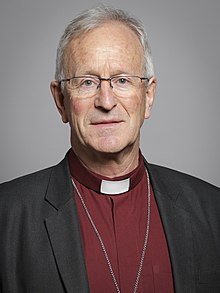The speech made by David Urquhart, the Lord Bishop of Birmingham, in the House of Lords on 10 October 2022.
My Lords, I have been immensely grateful for the stimulation and companionship I have found in your Lordships’ House as a Member for the last 12 years, not least in the last three or four speeches this afternoon on this immensely complex subject. It is worth turning up, if only to feel the embarrassment of my colleagues when one of their number is called “mature” and “sensible”—where better to hear it than here, in public and on the record?—and to be with the Minister, the noble Baroness, Lady Neville-Rolfe, with whom I share a long business background, although not necessarily in the same sector. I am particularly grateful to have been Convenor of this Bench for some years and to have been able to relate to the usual channels in the House informally. I am very grateful to those here who have accepted my presence at certain moments, whether they were to do with Brexit, the pandemic and the hybrid House, or even the late Queen’s funeral.
This is an opportunity just to say thank you to the officers of the House for the remarkable support that we received from them—in recent weeks, as it happened, day and night. I wish my successor as convenor of these Benches, my right reverend friend the Lord Bishop of St Albans, every success and the same wonderful co-operation and fulfilment.
For me the context of this deliberation on the economy and of many other debates in this House has been the vibrant and exciting life of the West Midlands, especially Birmingham, where we have recently enjoyed a financially as well as a socially and culturally successful Commonwealth Games. The first of my asks today is to ask the Government to be generous in supporting the legacy of this remarkable effort, and to do so much quicker than was mentioned earlier in this Chamber in response to a Question on the Olympic Games.
None the less, the numbers provided by economic science, checked, as they should be, by the Office for Budget Responsibility, the Institute for Fiscal Studies and, if you like, a charitable organisation called Full Fact, are either swinging out of control—consumer prices have already been mentioned in detail—or simply depressing: the fact of the depression of real earnings.
The theoretical or political points that arise—they will be made many times this afternoon—are puzzling and confusing to people in the regions who run their own economic life, I dare to say, with intelligence and wisdom, if not always rationally, but knowing the cost of food, housing, heating, clothing and holidays and how much money they have available to bring them into their charge.
I was glad to see the governing party described by the Prime Minister, after the Chancellor’s Statement, as one of “aspiration, enterprise and growth”. I like that phrase because it describes exactly what I have been trying to do in the Church for the last 40 years. The Prime Minister is quoted as saying:
“We believe in making it easier for our wealth creators, doers and makers to get things done”
to reset the economy and not manage decline. Again, those are very agreeable aims for the Church. However, will the Government answer the difficult questions faced by all of us: wealth created for whom, in an unequal society, doers with what skills in a competitive world market, and makers of what that people will buy at the right price?
I hope that Ministers in the years ahead, as well as in the months and even weeks ahead, will think clearly about how to articulate the principles behind these numbers and behind the very important points which have been made already this afternoon—clear principles in a complex scene. This is my last chance to mention two or three that matter to me: transparent measurements of success and failure, because we are allowed to fail but need to measure them transparently; a bigger picture of worldwide interdependence—we have mentioned the war but I mean the whole oikumene of the world—and longer-term cycles to achieve real change. These can be framed in a way to strengthen and be supported by local households, businesses and local authorities: discipline, development, distribution and devolution.
I see that I have overrun my time but I will finish by saying that this last point, devolution of power and influence, is very close to my heart. The new investment zones are welcome, as are the infrastructure projects listed, which in our own region are led by Andy Street, the West Midlands mayor. We will do well, but I ask the Government to go further and to make local influence part of an equal partnership, putting responsibility and resources where they belong in the local regions.
As a former Member of this House, Rabbi Jonathan Sacks, would remind us, to make a better world for all we need both market and state, but neither of those can provide the values on which they are to be built. Perhaps we should return to the prophet Micah as we continue this debate and remember that we are all called to do justice, love kindness and walk humbly with our God.
